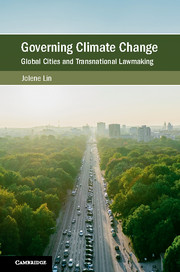Book contents
- Governing Climate Change
- Cambridge Studies on Environment, Energy and Natural Resources Governance
- Governing Climate Change
- Copyright page
- Contents
- Acknowledgements
- Abbreviations
- 1 Global Cities, Climate Change, and Transnational Lawmaking
- 2 Theoretical Framework
- 3 The Rise of the City in International Affairs
- 4 City Action on Climate Change
- 5 Transnational Urban Climate Governance via Networks: The Case of C40
- 6 Cities as Transnational Lawmakers
- 7 A Normative Assessment of Urban Climate Law
- 8 Conclusion
- Select Bibliography
- Index
4 - City Action on Climate Change
Published online by Cambridge University Press: 04 June 2018
- Governing Climate Change
- Cambridge Studies on Environment, Energy and Natural Resources Governance
- Governing Climate Change
- Copyright page
- Contents
- Acknowledgements
- Abbreviations
- 1 Global Cities, Climate Change, and Transnational Lawmaking
- 2 Theoretical Framework
- 3 The Rise of the City in International Affairs
- 4 City Action on Climate Change
- 5 Transnational Urban Climate Governance via Networks: The Case of C40
- 6 Cities as Transnational Lawmakers
- 7 A Normative Assessment of Urban Climate Law
- 8 Conclusion
- Select Bibliography
- Index
Summary
INTRODUCTION
The discussion in Chapter 3 showed how global cities are beginning to exert their presence in international affairs through acts of inter-city diplomacy and implementation of international law on their own accord. Global cities are also beginning to emerge as governance actors, and it is in the area of climate change that cities have been particularly active. To date, over 2,000 cities have specific plans to scale up their efforts at climate adaptation as well as strategies for GHG emission reductions. These cities do not act alone. They work in partnership with venture capitalists, research laboratories, and universities, as well as with other cities. Urban partnerships are often both local and transnational, and blur the private-public divide by involving private actors and public institutions alike.
This chapter showcases what five global cities – London, Mexico City, New York City, Rotterdam, and Seoul – are doing to address climate change. These global cities have consciously styled themselves as ‘climate frontrunners’. Through their proactive climate change policies and strategies, they have gained widespread recognition from policymakers, urban planners, the media, international organizations, and researchers. The aim of this chapter is not to provide detailed case studies or a comprehensive account of each city's mitigation and adaptation efforts. It also does not purport to analyze how and why various cities differ in their laws and policies. Instead, this chapter aims to provide an overview that will give readers a sense of what global cities are doing ‘on the ground’ within their territories to govern climate change.
An appreciation of the localized practices and practical aspects of global city action on climate change is important in at least two respects. One of the key ideas this book seeks to advance is that the practices, policies, and strategies taken at the local level bear wider significance and contribute towards transnational climate change governance when global cities seek to scale up their actions and pursue cooperation through cross-border networks. In this chapter, one observes the intertwined connections between urban institutions and global organizations, between local practices and transnational norms.
- Type
- Chapter
- Information
- Governing Climate ChangeGlobal Cities and Transnational Lawmaking, pp. 70 - 104Publisher: Cambridge University PressPrint publication year: 2018

